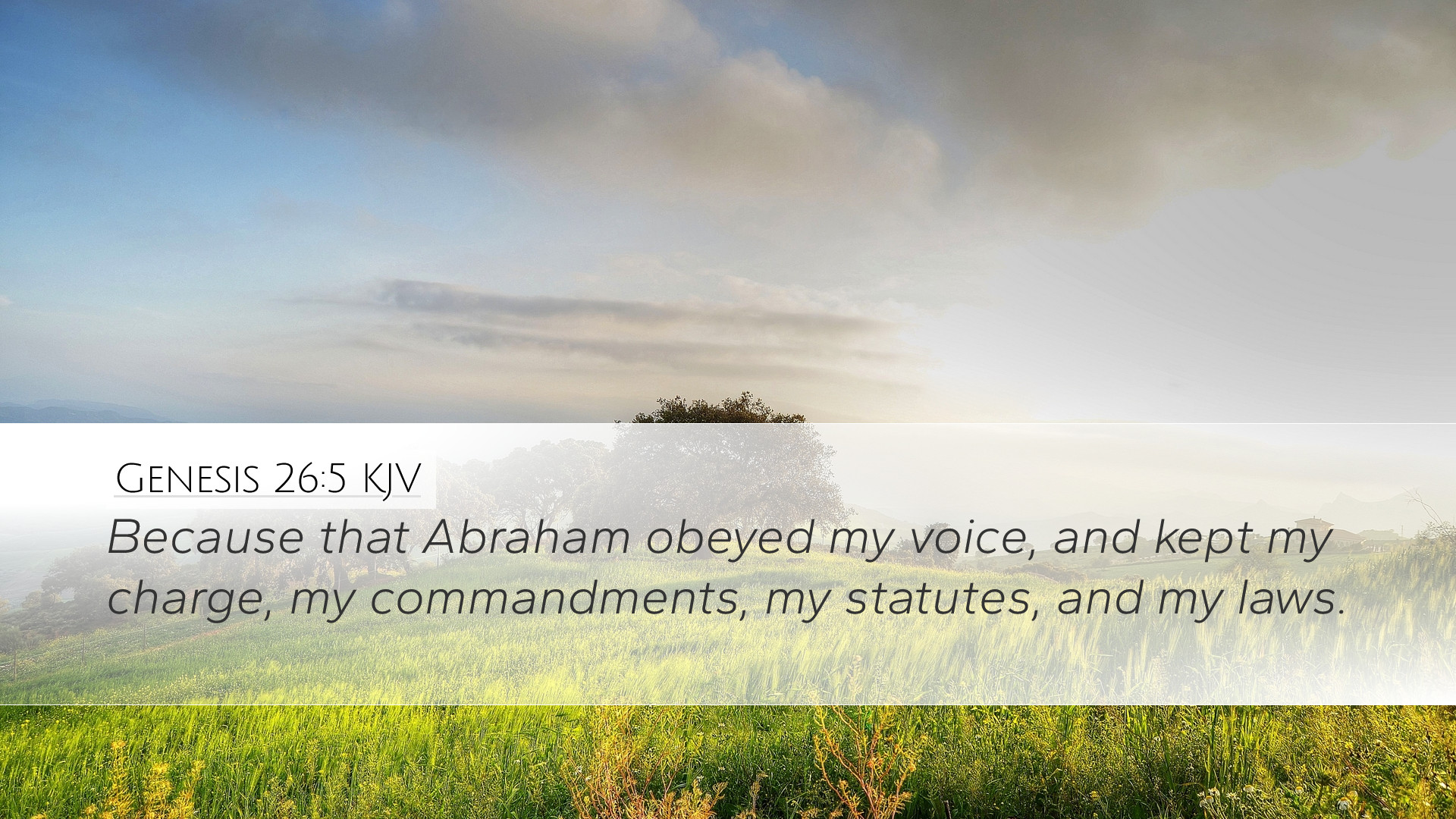Commentary on Genesis 26:5
Text of the Verse: "Because that Abraham obeyed my voice, and kept my charge, my commandments, my statutes, and my laws."
Introduction
This verse encapsulates God’s commendation of Abraham for his faithfulness and obedience. It serves as a significant reminder of the covenant relationship God established with Abraham, which affects generations to come, including Isaac during this specific passage.
Exegesis of Genesis 26:5
This verse appears within the context of God reaffirming His promises to Isaac during a time of famine. God indicates that the blessings promised to Abraham extend to his descendants, highlighting the theme of covenant continuity.
Abraham's Obedience as a Foundation
The core of God’s assurance to Isaac is tied to Abraham’s obedience. Each aspect of Abraham’s obedience is worth examining:
- Obeyed My Voice: Abraham's responsive attitude towards God’s instructions exemplifies a life led by divine inspiration rather than human reasoning.
- Kept My Charge: This refers to a faithful stewardship over what God entrusted to him, including his household and possessions.
- My Commandments and Statutes: Abraham's adherence to God's decrees reflects a profound understanding of divine law, which equates to a moral and ethical lifestyle aligned with God's will.
- My Laws: This points to the broader framework of divine regulations, suggesting that Abraham considered not merely a set of rules but a relational law rooted in love and commitment to God.
Insights from Matthew Henry
Matthew Henry points out that this verse illustrates that obedience is a prerequisite for enjoying God’s blessings. He remarks that, while God's promises are free gifts of grace, they are often linked with conditions—primarily, the believer's obedience. He underscores that Abraham's response to God reflects an intimate and personal relationship, which should inspire believers to likewise respond diligently to God's voice.
Insights from Albert Barnes
Albert Barnes emphasizes the importance of the repetition of God's covenant promises to Isaac, stating that Isaac's future was secured not merely on Abraham’s faithfulness but also through recognition of one’s personal relationship with God. Barnes highlights that this acknowledgment of Abraham serves as a foundation for Isaac's faith. Barnes also notes that it is through remembering the righteous lives of those who’ve gone before that new generations are motivated to walk in faithfulness.
Insights from Adam Clarke
Adam Clarke observes that this verse not only recognizes Abraham’s specific acts of obedience but also indicates a template for believers regarding their own spiritual walk. Clarke articulates that by obeying God's voice, believers enter into the divine order, similar to how Abraham did. He helps readers understand that God’s blessings rest upon a foundation of fidelity to His commandments. Clarke also mentions that obedience leads to inward peace and a outward manifestation of God’s favor.
Theological Implications
Genesis 26:5 has far-reaching theological implications, particularly regarding the nature of covenant and obedience. The verse emphasizes:
- The Principle of Inheritance: Isaac’s blessings are connected to Abraham, suggesting a spiritual inheritance that extends through generations.
- The Nature of Covenant Love: God’s covenant with Abraham is defined by mutual fidelity; this mutual relationship stands as a model for the believer's covenant with God today.
- The Role of Obedience in Faith: Obedience is not merely legalistic adherence but stems from genuine faith and love. It denotes a holistic approach to living in accordance with God's will.
Conclusion
Genesis 26:5 serves as a profound reminder for pastors, students, theologians, and Bible scholars that faithfulness to God is a continual theme throughout the Scriptures. The legacy of Abraham’s obedience can inspire all believers to pursue a relationship marked by attentive listening and responsive action to God's words. This relationship, built on trust and obedience, secures not only individual blessings but also affects future generations.
This verse serves as an exhortation for the contemporary believer: that our actions, as expressions of our faith, can have a long-lasting impact, echoing through generations, affirming God's promises and the beauty of His covenant love.


